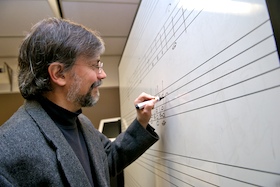
The Humanities and Technology Association (HTA) is an interdisciplinary scholarly society that explores the interactions of technology, science, humanities, and the social sciences. This year’s HTA conference will be held at BMCC on Saturday, October 4, at 10:00 a.m. in the Richard Harris Terrace. The event is open to everyone and free of charge.
The theme of this year’s conference is The Technology of Simple Things, and is co-sponsored by the Humanities and Technology Association and BMCC.
The HTA
Established in 1978, members of HTA aim to attract a broad range of disciplines and perspective in regard to technology. Howard Meltzer, Deputy Chair, Department of Music and Art at BMCC, currently serves as the Vice President of HTA.
Prof. Meltzer will begin the Technology of Simple Things conference with a brief introductory talk. Then, guest speakers will read academic papers they have written and researched. “People will present papers, reading them aloud for about twenty minutes,” says Meltzer. “These will be original research papers inspired by the technology of simple things.”
Speakers
Scheduled speakers include Ashok Kumar, from the University of Delaware, who will be reading Energetic Threat to Rural Sustainability; Kathryn A. Neeley of the University of Virginia, who will be reading The Friction Match and Women’s Liberation: How Technical Simplicity Illuminates Social Complexity; and Robert Farrell of Lehman College, who will be reading There is a Garden Chair—Braque’s Painting in a Metaphysical Epoch. BMCC Music and Art Professor Josephine Culkin will present a paper titled Comics and Technology: A Brief Overview. Approximately eight papers are expected to be presented.
In keeping with Technology of Simple Things theme, readers will not to introduce any slideshows or PowerPoint demonstrations; to keep everything simple. Only basic visual aids can be used, if any.
After the guest speakers read their papers, guests will be reading in order, at a scheduled time, a brief group discussion will immediately follow. “We have a really diverse group of speakers this year,” says Meltzer. Most of the presenters are faculty members and staffers from various schools across the U.S., although anyone is invited to attend the event and participate in the discussions.
Meltzer plans to read a paper about a monochord, something he describes as, “a piece of technology from ancient Greece that uses a single string.” His tech-themed paper is entitled Simple Technology: Monochords and Inspiration, an Introduction. According to Meltzer, the monochord is used to demonstrate how ratios determine musical intervals used in music, especially western music. “From a very simple device, we have all sorts of consequences,” says Meltzer of the monochord.
Join the Club
“HTA started in the late 70’s and for many years was located at Southern Polytechnic State University in Marietta, Georgia,” says Meltzer. “It was originally called ‘Interface’ and was originally for engineering students.”
According to Meltzer, an understanding of humanities and arts is essential for engineering students. Today, HTA brings together people from many disciplines, offering papers that are accessible to a wide audience. “The goal is to explain one discipline to another, and to attract anyone who finds any of the paper topics interesting,” says Meltzer. “HTA brings together people from different disciplines.”
National members of HTA receive a copy of Humanities and Technology Review, an annual publication that publishes papers that have been presented at various HTA conferences. Meltzer has had two works printed in the review, one in 2000 titled Artificial Music: Reception and Creativity and another in 2001 called An Aesthetics of Silence and Repetition.
For anyone is interested in joining HTA, membership information will be available at the conference.
To learn more about this year’s HTA conference at BMCC, visit www.bmcc.cuny.edu/music-art/hta/.
To find out more about HTA, visit www.humanitiesandtechnology.org

